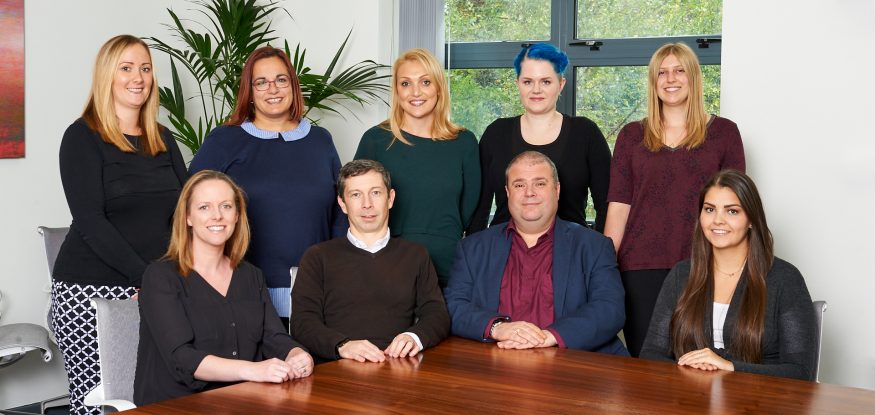Advancements in AML Treatment: Insights from the AML18 Trial
30 November 2023
A new publication in Blood for the AML18 trial adds to research evidence to help improve patient outcomes.
Acute Myeloid Leukemia (AML) represents a significant challenge in cancer care, particularly among adults where it is the most prevalent form of acute leukemia. Characterised by rapid progression, AML demands immediate and effective treatment strategies. A research focus on this condition stems from the urgent need for more effective therapies, especially for older patients over 60 years. Historically, treatment outcomes for this age group have not been satisfactory, lagging behind the progress made for younger patients.
The AML18 trial, a major research effort by the CTR team in collaboration with the NCRI AML Working Group, has been pivotal in addressing these gaps. Led by chief investigator Professor Nigel Russell with support from the Centre for Trials Research at Cardiff University, the trial commenced in 2013, encompassing multiple treatment strategies across the UK, Denmark, and New Zealand.
Building on the foundations laid by the AML16 trial, also sponsored by Cardiff University, the AML18 trial investigated the efficacy of various treatments, including mylotarg, for older AML patients. A key focus of the trial was determining the optimal dosage of mylotarg. Our findings indicate that two doses of mylotarg are more beneficial for most patients in this age group, particularly when coupled with a bone marrow transplant. Despite the advancements, we observed that the rate of patients over 70 receiving bone marrow transplants is still not at the expected level. Our ongoing research aims to identify and address the barriers faced by these patients.
A notable aspect of the AML18 trial has been its examination of the conjugated anti-CD33 monoclonal antibody, gemtuzumab ozogamicin (GO). The trial demonstrated, for the first time in a randomized comparison, that adding two fractionated doses of GO to intensive induction chemotherapy significantly improves outcomes in patients with intermediate- and good-risk AML, including those undergoing allogeneic transplantation. This breakthrough in the AML18 trial underscores a research commitment to enhancing AML treatment and offers new hope for patients battling this challenging form of leukemia.
Why this research is needed
In older patients (over 60 years of age) with acute myeloid leukaemia (AML), choice of treatment is dependent on many factors – for patients who are considered fit enough for intensive chemotherapy, outcome is not considered satisfactory. Improvements in treatment for older patients have been slower than those for the younger population. In the AML18 trial, we have tried to improve the number of patients who achieve a remission and to reduce the risk of disease returning.
Our involvement with the research
The CTR team, led by Ian Thomas, have been delivering the AML18 trial in collaboration with the NCRI AML Working Group, since 2013, with Professor Nigel Russell as Chief Investigator. The trial has involved a number of different treatment questions and has been open across the UK and in Denmark and New Zealand – the trial closed in December 2022.
Related studies
AML18 followed on from the AML16 trial, which was also Sponsored by Cardiff University and investigated new treatments, including mylotarg, in older patients with AML.
Why the new publication is important
The AML18 trial included an important question about the most appropriate dose of mylotarg that should be used in these patients. We report in this paper that 2 doses of mylotarg appears to be the best dose for most patients in this age group, and that the best results are achieved when patients also receive a bone marrow transplant.
The number of patients who are over 70 and receive a bone marrow transplant is improving over time but is still lower than we expect. We are now trying to find out what the obstacles may be for these patients. We have also asked a number of other questions about the best treatment for these patients, and these results will be reported in the coming months.
Read the recent paper in Blood: https://ashpublications.org/blood/article/142/20/1697/497487/Fractionated-vs-single-dose-gemtuzumab-ozogamicin
- December 2025
- October 2025
- June 2025
- May 2025
- April 2025
- March 2025
- February 2025
- December 2024
- November 2024
- October 2024
- September 2024
- July 2024
- June 2024
- May 2024
- April 2024
- March 2024
- December 2023
- November 2023
- September 2023
- July 2023
- June 2023
- April 2023
- March 2023
- February 2023
- December 2022
- November 2022
- October 2022
- September 2022
- August 2022
- July 2022
- June 2022
- May 2022
- April 2022
- March 2022
- February 2022
- January 2022
- November 2021
- September 2021
- July 2021
- June 2021
- May 2021
- March 2021
- February 2021
- December 2020
- November 2020
- September 2020
- August 2020
- July 2020
- January 2020
- December 2019
- October 2019
- September 2019
- July 2019
- June 2019
- May 2019
- April 2019
- February 2019
- December 2018
- November 2018
- October 2018
- September 2018
- August 2018
- July 2018
- June 2018
- May 2018
- April 2018
- March 2018
- December 2017
- October 2017
- August 2017
- July 2017
- June 2017
- May 2017
- April 2017
- March 2017
- February 2017
- January 2017
- December 2016
- October 2016
- August 2016
- June 2016
- April 2016
- March 2016
- February 2016